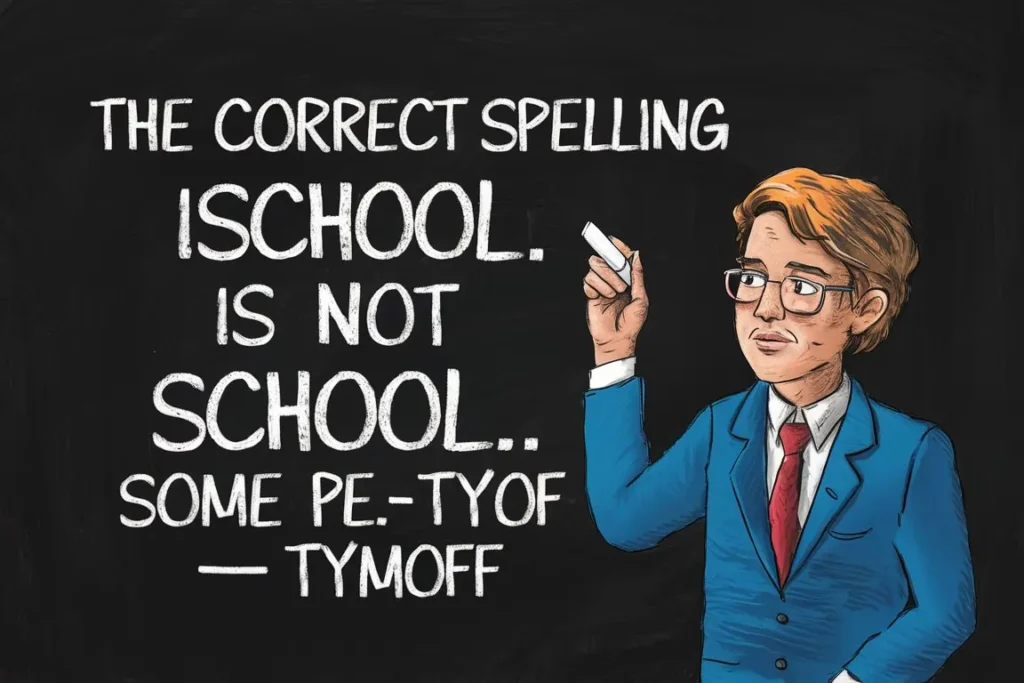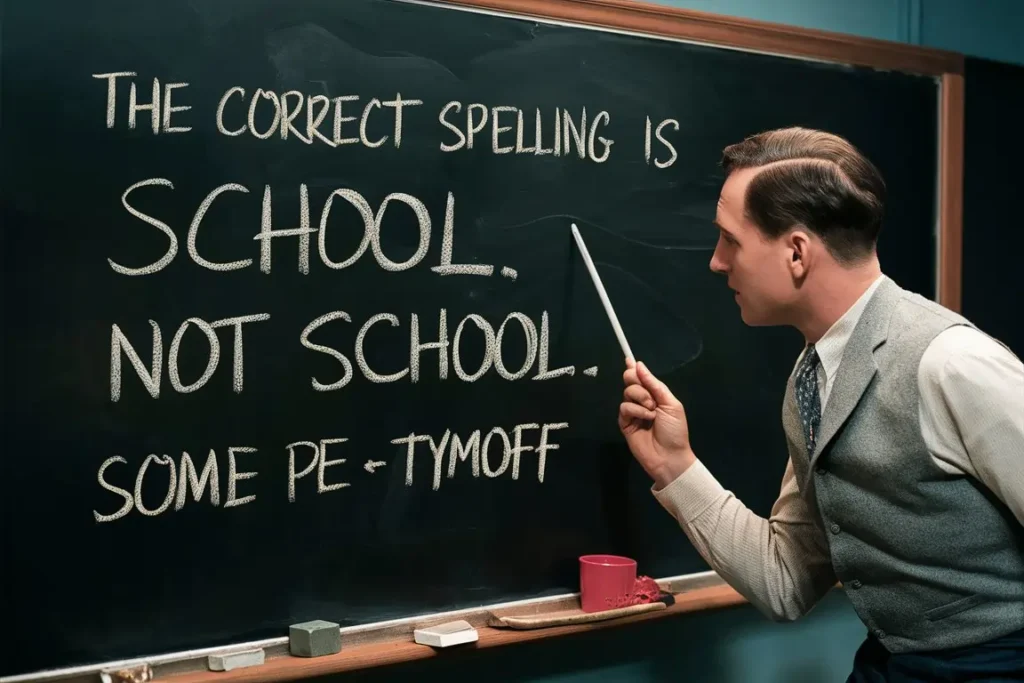The Correct Spelling is School, Not Shcool
Spelling matters. It’s more than just a detail; it’s a reflection of clarity and accuracy in communication. One of the most common spelling errors, “shcool” instead of “school,” demonstrates how even everyday words can trip us up. Despite its simple appearance, “school” is frequently misspelled due to letter transposition, pronunciation habits, or rushed typing.
In this guide, we’ll explore why spelling mistakes like “shcool” happen, and offer practical tips for avoiding them. By enhancing your spelling skills, you’ll communicate more effectively and make a stronger impression.
The Reasons Behind Common Spelling Errors
Even for fluent speakers, spelling mistakes are common. The error “shcool” is often a result of:
- Keyboard Proximity: The letters ‘h’ and ‘c’ are close together, making it easy to swap them, especially when typing quickly.
- Phonetic Confusion: English spelling doesn’t always align with pronunciation, which can lead to spelling errors. The word “school,” for instance, doesn’t sound like it contains an ‘h.’
- Lack of Focus: When rushing, it’s easy to overlook minor details. Errors like “shcool” reflect how hurried typing can affect accuracy.
Understanding these factors can help you become more mindful and improve your spelling over time. Errors like this are easy to make, but they’re also easy to fix with a bit of attention and practice.
The Importance of Good Spelling
 Spelling mistakes can affect your credibility, particularly in professional or academic settings. When words are spelled correctly, your writing appears more polished and trustworthy. People tend to judge spelling errors harshly, even if they’re minor. A consistent focus on correct spelling helps you present your thoughts more clearly, ensuring that readers aren’t distracted by typos or errors.
Spelling mistakes can affect your credibility, particularly in professional or academic settings. When words are spelled correctly, your writing appears more polished and trustworthy. People tend to judge spelling errors harshly, even if they’re minor. A consistent focus on correct spelling helps you present your thoughts more clearly, ensuring that readers aren’t distracted by typos or errors.
Practical Tips to Improve Your Spelling

Improving your spelling skills doesn’t require complicated techniques. Here are some effective strategies:
- Slow Down and Focus: Rushing leads to mistakes. By typing more deliberately, you can catch errors like “shcool” before they become a habit.
- Use Spelling Tools: Most writing platforms offer built-in spell checkers. Enable these tools to catch mistakes as you write, so you can correct them on the spot.
- Practice Regularly: The more you practice, the more familiar you become with correct spellings. Keep a list of words you frequently misspell and review it periodically.
- Learn the Rules: English spelling rules aren’t always intuitive, but understanding common patterns can make a difference. For instance, knowing that “sch” is a common start for words like “school” helps you recognize it visually.
- Sound Out Words: Sometimes, saying a word slowly can help you break down its components. With “school,” hearing the “sch” sound can guide you toward the correct spelling.
Commonly Misspelled Words and Why They Matter
Words like “school” are foundational, and frequent exposure makes it easy to overlook errors. Here are some other commonly misspelled words to watch for:
- Definitely (often misspelled as “definately”)
- Separate (often misspelled as “seperate”)
- Receive (often misspelled as “recieve”)
- Occasionally (often misspelled as “occassionally”)
Practicing these words alongside “school” can enhance your spelling skills overall. By familiarizing yourself with these tricky words, you’ll boost your confidence and avoid common pitfalls.
Why “School” Spelling Errors are So Common
“School” might seem simple, but its unusual combination of letters can confuse even seasoned writers. The “sch” blend is relatively uncommon in English, making it less intuitive for those who aren’t familiar with it. In many cases, the spelling “shcool” is an understandable mistake due to its uncommon structure.
The Role of Spelling in Education

Correct spelling plays a significant role in education. From a young age, students are taught to recognize and spell words accurately. Mastering correct spelling is essential for academic success, as it builds a foundation for reading and writing skills. For teachers, emphasizing the importance of spelling helps students develop effective communication habits early on.
Frequently Asked Questions about Spelling and Common Mistakes
Why is spelling accuracy important in digital communication?
Spelling affects how others perceive you. In digital settings, where communication is often quick, maintaining accuracy shows attention to detail and helps prevent misunderstandings.
Are there specific strategies to remember correct spelling patterns?
Yes, mnemonic devices, or memory aids, can help. For example, remembering “I before E, except after C” can guide you with words like “receive.”
How can students improve their spelling skills?
Students can practice spelling through repetition, quizzes, and engaging activities. Writing frequently and reading widely also exposes them to correct spellings.
Why do people often overlook simple spelling mistakes like “shcool”?
Simple mistakes can be overlooked due to familiarity. Since words like “school” are so common, people might skim over them without checking closely.
What resources are available for improving spelling?
Many online tools offer spelling practice, including spelling games, quizzes, and interactive exercises. Resources like Grammarly or Merriam-Webster’s website provide excellent spelling support.
How to Cultivate Good Spelling Habits
Cultivating good spelling habits takes time, but it’s well worth the effort. Here are a few more ways to improve your skills:
- Engage with the Content: Reading widely exposes you to correct spellings in various contexts, reinforcing your memory.
- Set Personal Goals: Aim to learn and master a certain number of words each week. Start with frequently misspelled words like “school,” and expand your list as you progress.
- Play Spelling Games: Games like Scrabble, Boggle, and online spelling challenges make learning fun and effective.
- Encourage Peer Review: If possible, have someone else review your writing. A fresh set of eyes can often catch errors you might miss.
Concluding Thoughts on Spelling and Communication
Spelling may seem minor, but it has a big impact. Small errors can affect your message, while correct spelling can enhance it. Paying attention to commonly misspelled words like “school” is a simple way to elevate your communication skills. Practice makes perfect, and with time, you can turn spelling into one of your strongest assets.
Embrace each opportunity to improve, and soon enough, you’ll notice the difference. Correct spelling not only reflects well on you but also ensures your ideas are conveyed with clarity and precision. So next time you spell “school,” remember—it’s all about getting it right.
Related Post:







